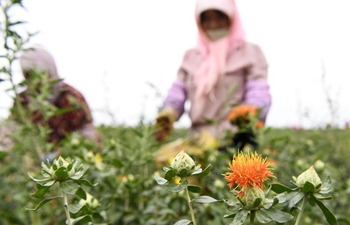ISLAMABAD, July 25 (Xinhua) -- Pakistan's National Institute of Health (NIH) issued an advisory to vaccinate sacrificial animals for the forthcoming religious festival of Eid in the Muslim-dominated country to avoid Crimean Congo Hemorrhagic Fever disease, as the fatality number from the disease keeps growing, local media reported Thursday.
The disease, also known as Congo Virus, is commonly found in the hairy skin of wild and domestic animals, and is transmitted by ticks, a small insect which inhabits in the skin of cattle.
Most of the animals sold during Eid come from villages, where farmers do not pay attention to the hygiene of animals, resulting in production of the virus and ticks. The insect-borne disease is transmitted to humans when the ticks bite them, transferring the virus in the bloodstream and resulting in bleeding and fever.
Five people have died of the disease in the country's south Sindh province since the beginning of this year, and health officials are concerned that the number of infected people may rise due to a close contact of humans with animals during their visit to animal markets to buy sacrificial animal for the Eid which is likely to fall on Aug. 12, the Express Tribune reported.
First case of the disease was reported in 2015 in Pakistan, and since then a total of 643 laboratory confirmed cases have been reported to the NIH across the country with a mortality rate of around 25 percent, local daily The News reported.
To avoid the spread of disease, the country's health departments have decided to create a public awareness drive to protect people from being stung by ticks. People visiting animal markets have been told to wear light-colored clothes with full sleeves, socks and gloves to avoid being stung by ticks.
The NIH has also directed district authorities to monitor sacrificial animals at entry points of the markets and vaccinate them to avoid the spread of the disease.
People buying the animals have also been advised to treat the animals with anti-virus body sprays at least a week ahead of scheduled slaughtering.













